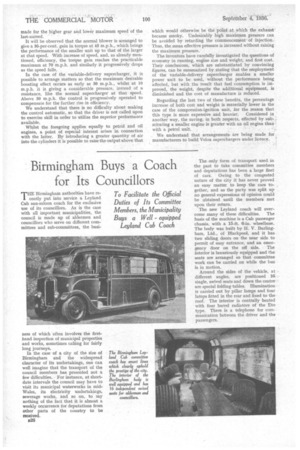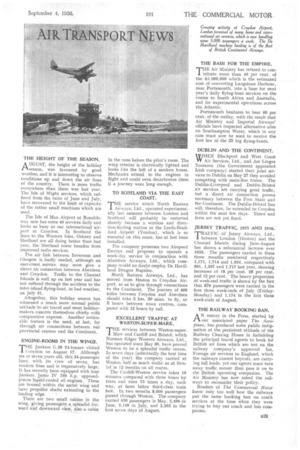Birmingham Buys a Coach
Page 42

Page 43

If you've noticed an error in this article please click here to report it so we can fix it.
for Its Councillors
THE Birmingham authorities have re cently put into service a Leyland Cub sun-saloon coach for the exclusive use of its councillors. As is the case with all important municipalities, the council is made up of aldermen and councillors who serve on different committees and sub-committees, the busi
ness of which often involves the firsthand inspection of municipal properties and works, sometimes calling for fairly long journeys.
In the case of a city of the size of Birmingham and the widespread character of its undertakings, one can well imagine that the transport of the council members has presented not a few difficulties. For instance, at shortdate intervals the council may have to visit its municipal waterworks in midWales, its electricity undertakings, sewerage works, and so on, to say nothing of the fact that it is almost a weekly occurrence for deputations from other parts of the country• to be received.
B28 The only form of transport used in the past to take committee members and deputations has been a large fleet of cars. Owing to the congested nature of the city it has never proved an easy matter to keep the cars together, and as the party was split up no general expressions of opinion could be obtained until the members met upon their return.
The new Leyland coach will overcome many of these difficulties. The basis of the machine is a Cub passenger chassis, with a 15-ft. 6-in. wheelbase. The body was built by H. V. Burlingham, Ltd., of Blackpool, and it has two sliding doors on the near side to permit of easy entrance, and an emergency door on the off side. The interior is luxuriously equipped and the seats are arranged so that committee work can be carried on while the bus is in motion.
Around the sides of the vehicle, at different angles, are positioned 16 single, swivel seats and down the centre are special folding tables. Illumination is carried out by pillar lamps and four latnps fitted in the rear and fixed to the roof. The interior is centrally heated with four barrel radiators of the Eby type. There is a telephone for communication between the driver and the passengers. THE HEIGHT OF THE SEASON.
A UGUST, the height of the holiday PA season, was favoured by good weather, and it is interesting to observe conditions up and down the air lines of the country. There is more traffic everywhere than there was last year. The Isle of Wight services, which suffered from the rains of June and _July, have recovered to the limit of capacity of the rather small machines which are used.
The Isle of Man Airport at Rona,Idsway now has some 40 services daily and looks as busy as our international airport at Croydon. In Scotland the lines to the Western Isles, Orkney and Shetland are all doing better than last year, the Shetland route benefits from improved radio services.
The air: link between Inverness and Glasgow is ,badly needed, although an east-coast service may soon give a direct air connection between Aberdeen and Croydon. Traffic to the Channel Islands is well up on last year and has not suffered through the accident to the inter-island flying-boat, in bad weather, on July 31.
Altogether, this holiday season has witnessed a much more normal public attitude to air travel and most holidaymakers concern themselves chiefly with comparative expense. Another noticeable feature is the need, at last, for through air connections between our provincial centres and the Centinent.
ENGINE-ROOMS IN THE WINGS.
THE JunkersG.38 24-tonner visited Croydon on August 17. Although six or seven years old, this 34-passenger liner, with its crew of seven, has modern lines and is impressively large. It has recently been equipped with four Junkers lumo IV 750 h.p, opposedpiston liquid-cooled oil engines. These are housed within the metal wing and have propeller shafts extending to the leading edge.
There are two small cabins in the wing, giving passengers a. splendid forward and downward view, also a cabin
in the nose before the pilot's room. The wing interior is electrically lighted and looks like the loft of a modern house. Mechanics attend to the engines in flight and could even decarbonize them if a journey were long enough.
TO SCOTLAND VIA THE EAST COAST.
THE service which North Eastern Airways, Ltd., operated experimentally last summer between London and Scotland will probably be restarted shortly because a wireless and direction-finding station at the Leeds-Bradford Airport (Yeadon), which is so essential on this route, has at last been installed.
The company possesses two Airspeed Envoys and proposes to operate a week-day service in conjunction with Aberdeen Airways, Ltd., which company would no doubt employ De Havilland Dragon Rapides.
North Eastern Airways, Ltd., has moved from Heston to Croydon Airport, so as to give through connections to the Continent. The journey of 460 miles between Croydon and Aberdeen should take 8 hrs. 20 mins. to fly, or 5 hours between town centres, Compared with 12 hours by rail.
EXCELLENT TRAFFIC AT WESTON-SUPER-MARE.
THE services between Weston-super
Marc and Cardiff and Bristol, which Norman Edgar Western Airways, Ltd., has operated since May 30, have proved Weston to be a splendid traffic centre. In seven days (admittedly the best time of the year) the company carried at Weston half as much traffic as at Bristol in 12 months on all routes, The Cardiff-Weston service takes 10 minutes compared with three hours by train and runs 13 times a day, each way, at fares below third-class train fare. In two months 8,000 passengers passed through Weston. The company carried 520 passengers in May, 2,496 in June, 3,149 in July, and 2,393 in the first seven days of August. THE BASE FOR THE EMPIRE.
THE Air Ministry has refused to contribute more than 40 per cent. of the £1,000,000 which is the estimated cost of converting Langstone Harbour, near Portsmouth, into a base for next year's daily flying-boat services on the routes to South Africa and Australia, and for experimental operations across the Atlantic.
Portsmouth hesitates to bear 60 per cent, of the outlay, with the result that Air Ministry and Imperial Airways' officials have inspected alternative sites on Southampton Water, which in any case must now be used to receive the first few of the 28 big flying-boats.
DUBLIN AND THE CONTINENT.
WHEN Blackpool and West Coast IT Air Services, Ltd., and Aer Lingus Teoranta (the Government appointed Irish company) started their joint services to Dublin on May 27 they avoided competing with main-line trains. The Dublin-Liverpool and Dublin-Bristol air services are carrying good traffic, but a direct air connection proves necessary between the Free State and the Continent. The Dublin-Bristol line will, therefore, be extended to Croydon within the next few days. Times and fares are not yet fixed.
JERSEY TRAFFIC, 1935 AND 1936.
'TRAFFIC of Jersey Airways, Ltd., 1 between London (Heston) and the Channel Islands during June-August has shown a substantial increase over 1935. The passengers carried in these three months numbered respectively 1;171, 1,714 and 1,924, compared with 991, 1,337 and 1,717 last year, showing increases of 18 per cent. 28 per cent. and 12 per cent. The heavy proportion of week-end traffic is shown by the fact that 879 passengers were carried in, the first three week-ends of July (FridayMonday) and 1,174 in the first three week-ends of August.
THE RAILWAY BOOKING BAN.
AN outcry in the Press, started by our associated paper The Aeroplane, has produced some public indignation at the persistent attitude of the Railway Clearing House in forbidding the principal travel agents to book for British air lines which are not on the railway company's approved list. Foreign air services to England, which the railways cannot boycott, are carrying full loads, yet our agents must turn away traffic sooner than pass it on to the British operating companies. The Air Ministry has now asked the railways to reconsider their policy.
Readers of The Commercial Motor know only too well how the railways put the same booking ban on coach services at the time when they were trying to buy out coach and bus companies.




























































































